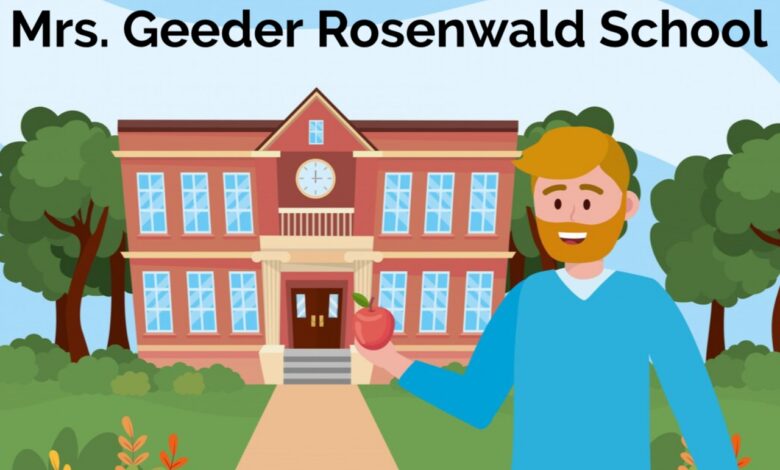
The history of education in the United States is rich with stories of individuals and institutions that have played transformative roles in shaping the future of countless students. Among these stories lies the profound legacy of Mrs. Geeder and the Rosenwald Schools. The contributions of these educational pioneers have had a lasting impact, particularly in underserved African American communities during the early 20th century. This article delves into the significance of the Mrs. Geeder Rosenwald School, exploring its historical context, contributions to education, and the profound influence Mrs. Geeder had on the Rosenwald School movement.
The Early 20th Century Education Landscape for African Americans
At the turn of the 20th century, education for African Americans in the southern United States was in a deplorable state. Jim Crow laws and segregation severely limited access to quality education for Black students. Public funding for African American schools was either nonexistent or grossly inadequate, and many students were forced to attend dilapidated, overcrowded schools with minimal resources. The disparity in educational opportunities between white and Black children was glaring, perpetuating a cycle of poverty and limited opportunities for African Americans.
It was during this time of educational inequality that individuals like Julius Rosenwald and Booker T. Washington sought to make a difference. In the early 1900s, the collaboration between Rosenwald, a philanthropist and part-owner of Sears, Roebuck, and Co., and Washington, the founder of Tuskegee Institute, led to the development of the Rosenwald Schools. These schools aimed to provide better educational opportunities for African American children across the South. Mrs. Geeder, a key figure in this movement, helped make this vision a reality.
Who Was Mrs. Geeder?
While Julius Rosenwald and Booker T. Washington are often credited with the inception of the Rosenwald School movement, Mrs. Geeder’s role has often been overlooked. Mrs. Geeder was a dedicated educator and community leader who played a significant role in the establishment and management of several Rosenwald Schools. Her commitment to improving educational access for African American students was unwavering, and she worked tirelessly alongside local communities to ensure the success of these schools.
Born into a period of extreme racial segregation, Mrs. Geeder recognized the need for change in the education system. She believed that access to quality education was the key to empowering African Americans and lifting them out of the cycle of poverty. Her work with Rosenwald Schools was driven by a deep passion for social justice and a firm belief that education could be the great equalizer in society.
The Rosenwald Schools: A Vision of Educational Equality
The Rosenwald Schools were a monumental step toward closing the education gap between Black and white students in the South. These schools were typically small, rural institutions designed to provide basic education to African American children who otherwise would have had little to no access to schooling. The schools were funded through a combination of local donations, community fundraising, and substantial financial contributions from Julius Rosenwald himself.
Mrs. Geeder was instrumental in the day-to-day operations of many of these schools. Her ability to organize local communities, raise funds, and advocate for the needs of her students helped ensure the success of the Rosenwald Schools in her region. She worked closely with teachers, parents, and students to create an environment where children could learn and thrive, despite the limited resources available to them.
The Educational Philosophy of Mrs. Geeder
Mrs. Geeder’s educational philosophy was rooted in the belief that every child, regardless of their race or socioeconomic status, deserved access to a quality education. She saw education as a tool for personal empowerment and community upliftment. In her work with the Rosenwald Schools, she emphasized the importance of providing students with a well-rounded education that included not only basic literacy and numeracy skills but also vocational training and life skills.
Mrs. Geeder believed in the power of education to transform lives, and she instilled this belief in her students. She encouraged them to strive for excellence and to see their education as a pathway to a better future. Her dedication to her students was unwavering, and she often went above and beyond to ensure that they had the resources they needed to succeed.
The Role of Community in the Success of Rosenwald Schools
One of the key elements of the success of the Rosenwald Schools was the involvement of local communities in their establishment and operation. Mrs. Geeder was a master at galvanizing community support for her schools. She understood that for these schools to thrive, they needed the active involvement of parents, teachers, and local leaders.
Community members were often responsible for donating land, materials, and labor to build the schools. Mrs. Geeder worked tirelessly to secure these resources, often organizing fundraising events and reaching out to local businesses for support. She also worked to build strong relationships with parents, encouraging them to take an active role in their children’s education.
This sense of community ownership was crucial to the success of the Rosenwald Schools. It ensured that the schools were well-maintained and that students received the support they needed to succeed. Mrs. Geeder’s ability to foster this sense of community was one of the key reasons why the Rosenwald Schools in her region were so successful.
Challenges Faced by Mrs. Geeder and the Rosenwald Schools
Despite the many successes of the Rosenwald Schools, Mrs. Geeder and her colleagues faced numerous challenges. Racial segregation and discrimination were rampant in the South, and many white communities were openly hostile to the idea of improving educational opportunities for African Americans. In some cases, Rosenwald Schools were targets of vandalism and violence, and teachers and students faced constant threats.
In addition to these external challenges, the schools themselves often operated with minimal resources. Funding was limited, and many schools lacked basic supplies and facilities. Teachers, including Mrs. Geeder, were often paid very little, and they had to be resourceful in finding ways to provide a quality education with the limited resources available to them.
Despite these challenges, Mrs. Geeder remained committed to her work. She believed deeply in the importance of education and was willing to endure personal hardship to ensure that her students had the opportunity to learn. Her resilience and determination in the face of adversity are a testament to her character and dedication.
The Long-Lasting Impact of Mrs. Geeder Rosenwald School
The impact of Mrs. Geeder and the Rosenwald Schools cannot be overstated. By the time the Rosenwald School initiative ended in the 1930s, over 5,000 schools had been built across the South, providing education to hundreds of thousands of African American children. The schools helped to close the education gap between Black and white students and laid the groundwork for future educational reforms, including the eventual desegregation of schools in the 1950s and 1960s.
Many of the students who attended Rosenwald Schools went on to become leaders in their communities, contributing to the Civil Rights Movement and advocating for further social and educational reform. The legacy of Mrs. Geeder and the Rosenwald Schools lives on through these individuals and their contributions to society.
Preservation of Rosenwald Schools and Mrs. Geeder’s Legacy
Today, many of the original Rosenwald Schools have been preserved as historical landmarks. Efforts are underway to restore these buildings and honor the legacy of the individuals, like Mrs. Geeder, who made them possible. These preservation efforts serve as a reminder of the important role that education plays in promoting social justice and equality.
Mrs. Geeder’s legacy, in particular, is one that continues to inspire educators and advocates for educational equity. Her dedication to her students, her community, and the cause of educational equality serves as a powerful example of what can be achieved through perseverance and a commitment to justice.
Read More: The Legacy of Tartan High School Ann Bacon: An Education Journey of Success
Conclusion: Honoring the Legacy of Mrs. Geeder and the Rosenwald Schools
The story of Mrs. Geeder and the Rosenwald Schools is one of resilience, determination, and the transformative power of education. At a time when African Americans were systematically denied access to quality education, Mrs. Geeder and others like her stepped up to provide opportunities for children who had been left behind by society.
The legacy of the Mrs. Geeder Rosenwald School is a reminder of the critical role that education plays in shaping the future. It highlights the importance of community involvement, the power of education to uplift individuals and communities, and the enduring impact of those who dedicate their lives to the pursuit of justice and equality.
As we reflect on the legacy of Mrs. Geeder and the Rosenwald Schools, we are reminded of the ongoing struggle for educational equity in the United States. While significant progress has been made since the days of segregation, disparities in educational opportunities still exist. Mrs. Geeder’s work serves as an inspiration for those who continue to fight for equal access to education for all students, regardless of race or socioeconomic status.



